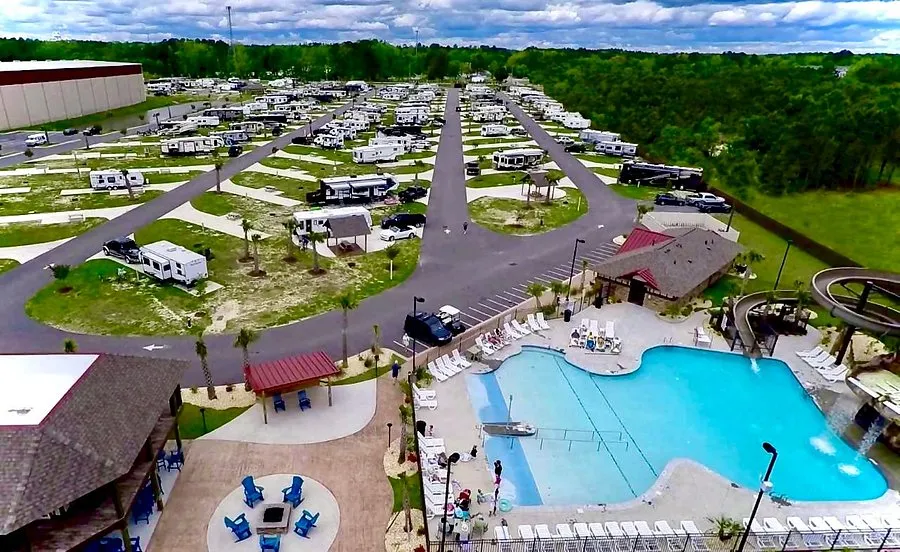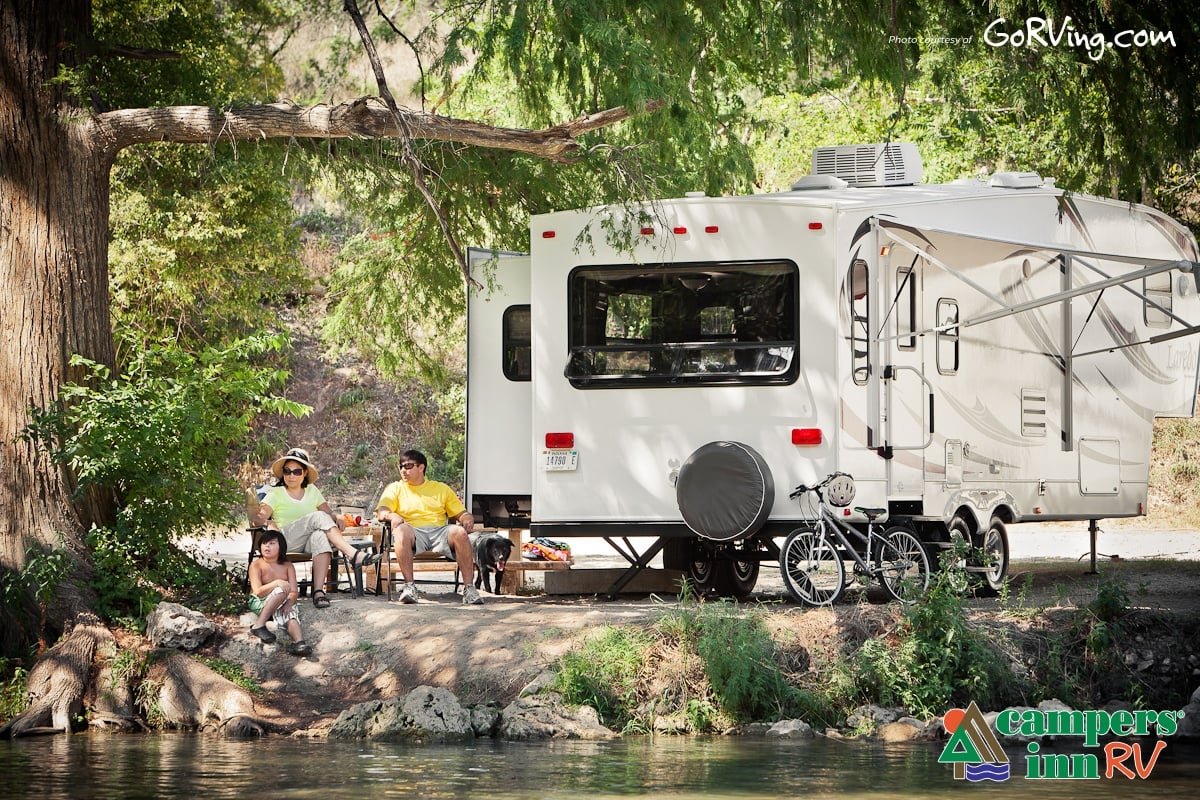Finding the perfect RV resort requires careful evaluation of three critical elements that can make or break your camping experience. Many RVers focus solely on price or availability, only to discover their chosen resort lacks essential hookups or sits in an inconvenient location.
The right RV resort balances quality amenities, reliable hookups, and strategic location to create a comfortable base for your adventures. Modern RV resorts offer varying levels of service, from basic campsites with minimal facilities to luxury destinations featuring pools, restaurants, and full recreational programs.
Smart resort selection involves understanding your specific needs and matching them with available facilities and services. This process requires examining hookup options, evaluating nearby attractions and services, and assessing the overall environment that will enhance your stay rather than create frustration.
Key Factors in Choosing the Right RV Resort
Selecting the perfect RV campground requires careful evaluation of your personal needs, RV specifications, and financial constraints. These core considerations determine whether an RV site will provide a comfortable and enjoyable experience.
Understanding Your Camping Style and Preferences
Different travelers have distinct preferences that shape their ideal RV park experience. Some prefer luxury amenities like swimming pools, fitness centers, and organized activities. Others seek quiet, natural settings with minimal facilities.
Family travelers typically prioritize playgrounds, game rooms, and kid-friendly activities. Adult-only resorts appeal to those wanting peaceful environments without children’s noise. Adventure seekers look for campgrounds near hiking trails, fishing spots, or water sports.
Amenity priorities vary significantly:
- Social travelers: Clubhouses, planned events, group activities
- Tech-dependent campers: Strong Wi-Fi, cable TV, charging stations
- Pet owners: Dog parks, pet-washing stations, walking trails
- Luxury seekers: Spas, concierge services, premium sites
Consider whether you prefer staying close to urban attractions or remote natural areas. Some RV parks offer shuttle services to nearby cities. Others provide direct access to national parks or wilderness areas.
RV Size and Site Compatibility
RV dimensions directly impact which sites are suitable for your vehicle. Large motorhomes and travel trailers require spacious sites with adequate maneuvering room. Smaller RVs have more campground options available.
Critical measurements to consider:
- Total length including tow vehicle
- Height clearance for trees and structures
- Slide-out requirements when extended
- Weight restrictions on site surfaces
Many RV parks specify maximum lengths for different site types. Back-in sites often accommodate longer rigs than pull-through sites. Sites with full hookups may have size limitations based on utility placement.
Check turning radius requirements for your specific RV. Some campgrounds have tight corners or narrow roads unsuitable for larger vehicles. Call ahead to verify accessibility before making reservations.
Budget Considerations and Trip Duration
RV resort costs vary dramatically based on location, amenities, and season. Luxury resorts with premium amenities charge significantly more than basic campgrounds. Peak season rates often double off-season prices.
Typical cost factors include:
- Nightly site fees
- Utility surcharges for electrical usage
- Pet fees and deposits
- Activity or amenity charges
Longer stays often qualify for weekly or monthly discounts. Many RV parks offer reduced rates for stays exceeding seven days. Extended winter stays in popular destinations like Arizona or Florida provide substantial savings.
Budget for additional expenses beyond site fees. Resort towns typically have higher grocery and dining costs. Factor in fuel expenses for exploring nearby attractions from your chosen campground location.
Consider membership programs that provide discounts across multiple RV park networks. These programs often pay for themselves within a few trips for frequent travelers.
Essential RV Resort Amenities to Look For
Modern RV travelers expect specific essential amenities that transform a basic campground into a comfortable home base. The most critical features include reliable hookups for daily living needs, strong connectivity for work and communication, clean facilities for personal hygiene, and recreational options for entertainment.
Full Hookups: Water, Electricity, and Sewer
Full hookup sites represent the foundation of any quality RV resort experience. These essential amenities provide complete independence from external facilities.
Electrical hookups should offer multiple amperage options to accommodate different RV sizes. Most resorts provide 30-amp and 50-amp service, with some locations still offering 15-amp connections for smaller units.
Water connections deliver fresh water directly to the RV’s plumbing system. This convenient amenity eliminates the need to fill onboard tanks or carry water containers from central spigots.
Sewer hookups allow direct waste disposal without using dump stations. RV travelers can empty gray and black water tanks immediately rather than storing waste until departure.
Sites without full hookups require visitors to move their rigs to dump stations periodically. This process creates inconvenience and limits stay flexibility for extended visits.
Wi-Fi, Cell Service, and Connectivity
Reliable internet connectivity has become essential for modern RV travelers who work remotely or maintain digital connections. Many guests depend on strong wi-fi for business operations, entertainment streaming, and communication with family.
Wi-fi quality varies significantly between resorts. Premium locations provide high-speed connections capable of supporting video calls and large file transfers. Basic RV parks may offer limited bandwidth that struggles with multiple connected devices.
Cell tower proximity affects mobile data reliability. Resorts located in remote areas often experience weak cellular signals that impact phone calls and mobile internet access.
Connectivity backup options become crucial when primary internet fails. Travelers should verify whether resorts offer multiple internet providers or cellular signal boosters throughout the property.
Clean Restrooms, Showers, and Laundry Facilities
Shared facilities supplement onboard RV amenities and provide essential services for extended stays. Clean, well-maintained restrooms and showers demonstrate resort management quality.
Restroom cleanliness standards reflect overall property maintenance. Facilities should receive regular cleaning with adequate supplies of toilet paper, soap, and paper towels.
Shower facilities offer more spacious bathing compared to compact RV bathrooms. Quality resorts maintain consistent hot water pressure and provide hooks for clothing and toiletries.
Laundry facilities enable clothing care during extended trips. Commercial-grade washers and dryers handle bedding and heavy items that exceed RV machine capacity.
Some resorts charge additional fees for laundry access while others include these services in site rental costs.
On-Site Recreational Features
Recreational amenities distinguish premium resorts from basic campgrounds. These features provide entertainment options that enhance the overall camping experience.
Swimming pools offer refreshing recreation during warm weather. Heated pools extend swimming seasons while spa facilities add luxury appeal for adult guests.
Playground equipment attracts families traveling with children. Well-designed play areas keep kids engaged while parents relax at their sites.
Activity centers host organized events like game nights, craft sessions, and seasonal celebrations. These social spaces help guests connect with fellow travelers.
Walking trails provide exercise opportunities without leaving resort grounds. Paved paths accommodate guests with mobility limitations while natural trails offer scenic exploration.
Sports facilities such as tennis courts, basketball courts, or disc golf courses appeal to active travelers seeking physical recreation during their stays.
Evaluating RV Resort Location and Accessibility
The location of an RV resort determines the success of your entire trip, affecting everything from your daily activities to the ease of getting there. Smart travelers evaluate proximity to attractions, access to essential services, and the practical aspects of navigating their RV to and within the resort.
Proximity to Attractions and Activities
The distance between your RV resort and key attractions directly impacts your travel experience and daily costs. Resorts within 30 minutes of major attractions offer convenience without requiring long drives or excessive fuel consumption.
Consider the types of activities that matter most to your group. National parks, beaches, hiking trails, and cultural sites should factor into your location decision. A resort near multiple attraction types provides flexibility for different weather conditions or changing interests.
Research seasonal accessibility of nearby attractions. Some mountain activities close in winter, while beach destinations may have limited services during off-season periods. Verify operating hours and seasonal schedules before booking your stay.
Popular attraction categories to consider:
- National and state parks
- Historical sites and museums
- Water activities (lakes, rivers, beaches)
- Entertainment districts
- Outdoor recreation areas
Access to Local Amenities and Services
Essential services within a reasonable distance make extended stays more comfortable and practical. Grocery stores, medical facilities, and fuel stations should be accessible within 15-20 minutes of your chosen resort.
Evaluate the quality and variety of nearby shopping options. Full-service grocery stores, pharmacies, and hardware stores handle most traveler needs. Rural locations may have limited options, requiring advance planning for supplies.
Medical services become crucial for longer stays or travelers with health considerations. Identify the nearest urgent care facilities, hospitals, and specialized medical services before arrival.
Essential local amenities:
- Grocery stores and pharmacies
- Gas stations and propane refills
- Banks and ATMs
- Post offices and shipping services
- Restaurants and dining options
Consider internet connectivity and cell service strength in remote locations, especially if you work remotely or need reliable communication.
Road Conditions and RV Maneuverability
The route to your chosen resort and internal road conditions affect both safety and convenience. Steep grades, narrow roads, and poor surfaces create challenges for larger RVs and inexperienced drivers.
Research road conditions using RV-specific GPS systems and apps that account for vehicle height, weight, and length restrictions. Standard GPS systems may route RVs through unsuitable roads with low bridges or weight limits.
Evaluate the resort’s internal road system and site accessibility. Wide roads, gentle turns, and pull-through sites make positioning your RV significantly easier. Narrow roads or tight turns may require backing skills that some travelers lack.
Road factors to investigate:
- Maximum grades: Steep hills challenge underpowered vehicles
- Bridge clearances: Height restrictions for tall RVs
- Weight limits: Important for heavy motorhomes
- Road surface quality: Gravel vs. paved access roads
- Seasonal conditions: Snow, ice, or flood-prone areas
Contact resort management directly about road conditions and site accessibility for your specific RV dimensions. Many resorts provide detailed directions that avoid problematic routes for RV travelers.
Additional Considerations for RV Campground Selection
Several key factors beyond basic amenities and hookups can significantly impact your overall satisfaction with an RV resort. Pet policies, safety standards, and thorough research through reviews help ensure you find the perfect RV campsite for your specific needs.
Pet-Friendly and Family-Oriented Policies
RV travelers with pets should carefully examine campground pet policies before booking. Many resorts impose breed restrictions that could prevent certain dogs from staying, regardless of temperament or training.
Essential pet policy questions include:
- Daily pet fees and additional charges
- Leash requirements and designated off-leash areas
- Pet waste disposal locations and cleanup policies
- Access to dog parks, walking trails, and swimming areas
Family-oriented campgrounds typically offer specialized amenities for children. These may include playgrounds, game rooms, organized activities, and family-friendly events. Some resorts provide supervised children’s programs during peak seasons.
Parents should verify age restrictions for certain amenities like pools or fitness centers. Quiet hours and noise policies become particularly important for families seeking peaceful evenings after active days.
Safety, Cleanliness, and Security Standards
Safety standards directly impact peace of mind during RV camping experiences. Well-maintained campgrounds feature adequate lighting throughout common areas and roadways, reducing risks during evening hours.
Secure entry points, whether gated entrances or controlled access systems, provide additional protection for extended stay guests. Many quality resorts employ 24-hour staff availability or on-call assistance for emergencies.
Cleanliness standards reflect overall management quality. Inspect restroom facilities, laundry areas, and common spaces during site visits. Well-maintained grounds with regular trash collection and landscaping indicate attentive management.
Fire safety measures should include accessible fire extinguishers, clear evacuation routes, and enforced fire restrictions during dry conditions. Proper electrical systems with updated hookups reduce risks of power-related incidents.
Reviews, Ratings, and Booking Strategies
Online reviews and ratings provide valuable insights into actual RV experiences at potential campgrounds. Focus on recent reviews within the past year, as management changes can significantly alter service quality.
Key review elements to evaluate:
- Consistency of positive feedback across multiple platforms
- Management responses to negative reviews
- Specific mentions of cleanliness, staff helpfulness, and amenity quality
- Photos from recent guests showing actual site conditions
Booking strategies vary depending on travel flexibility and seasonal demands. Peak season reservations often require booking months in advance, particularly for popular destinations or holiday weekends.
Cancellation policies become crucial when travel plans change unexpectedly. Some campgrounds offer full refunds within specific timeframes, while others provide only future stay credits. Flexible booking options prove especially valuable for RV living situations where weather or mechanical issues might alter travel schedules.
Direct booking through campground websites sometimes offers better rates than third-party reservation systems. Many resorts provide loyalty programs or extended stay discounts for guests planning longer visits.
Frequently Asked Questions
RV resort selection involves numerous considerations from amenity evaluation to hookup requirements. These common questions address the practical aspects of choosing accommodations that match specific travel needs and preferences.
What should I consider when evaluating the amenities offered by an RV resort?
Prioritize essential amenities like clean bathrooms, laundry facilities, reliable Wi-Fi, and full hookups while considering recreational features such as pools, dog parks, and camp stores based on your specific travel needs.
How do I determine if an RV resort’s location is ideal for my travel plans?
Evaluate proximity to your intended attractions, accessibility to grocery stores and medical facilities, climate conditions, and distance from major highways or noise sources that could impact your stay.
What variations exist in RV hookup types and what should I look for?
Standard hookups include 30-amp or 50-amp electrical connections, fresh water, and sewer connections, with some sites offering cable TV and enhanced electrical service for larger RVs with higher power demands.
Can you explain the importance of site size and clearance when selecting an RV resort?
Adequate site dimensions accommodate your RV length plus tow vehicle, while proper clearance ensures safe maneuvering around low branches, narrow roads, and neighboring campsites without damage.
What are the common policies on pet-friendliness and kid-friendliness at RV resorts?
Pet policies typically include breed restrictions, leash requirements, and additional fees, while family-friendly resorts offer playgrounds, swimming pools, and organized activities versus adult-only sections with quiet hours enforcement.
How does seasonality and peak timing affect availability and choice of RV resorts?
Peak seasons like summer and holidays reduce availability and increase rates, while shoulder seasons offer better selection and pricing, though some amenities may operate on limited schedules.




